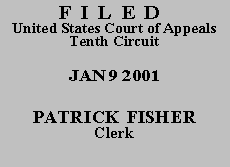

Michael Spencer, a state prisoner proceeding pro se, appeals the district court's dismissal of his 42 U.S.C. § 1983 action for failure to state a claim. We have jurisdiction under 28 U.S.C. § 1291 and affirm.
Spencer filed his original § 1983 complaint on July 13, 1999, alleging Wyoming officials deprived him of "due process when they failed to protect and afford him his rights pursuant to the IADA"; the Wyoming officials deprived him of personal property "in violation of the U.S. Constitution"; and that Virginia officials "fraudulently submitted federal documents to Colorado courts" to gain custody of Spencer. Record, Doc. 2 at 3-4. On July 23, 1999, Spencer filed an amended complaint, alleging "unlawful taking of [Spencer] by force and by means of fraud, against his will, by the State of Virginia"; that he was denied and deprived of "due process to the United States Constitution by Colorado, Wyoming and Nebraska"; and "malicious prosecution by Virginia," aided and abetted by Colorado, Wyoming, and Nebraska. Id., Doc. 5 at 3-4. As an amended complaint supersedes the original complaint, only the allegations in the July 23 complaint will be considered. See Miller v. Glanz, 948 F.2d 1562, 1565 (10th Cir. 1991).
The crux of Spencer's complaint is his challenge to his parole by Colorado to the state of Virginia pursuant to the Interstate Agreement on Detainers (IAD), a compact among forty-eight states, the United States, and the District of Columbia, "to encourage the expeditious and orderly disposition of [outstanding] charges and determination of the proper status of any and all detainers based on untried indictments, informations, or complaints." United States v. Coffman, 905 F.2d 330, 331 (10th Cir. 1990).
In dismissing Spencer's complaint for failure to state a claim for relief, the district court found he failed "to present the facts that form[ed] the basis of his claims and his conclusory allegations render[ed] his complaints largely incomprehensible." Record, Doc. 31 at 2. The court further found he failed to allege "any personal participation or conduct by any individual defendant," and "his claims against the states of Virginia, Wyoming, Colorado, and Nebraska, or against state officials in their official capacities [were] barred by the Eleventh Amendment." Id. at 2-3. With respect to the cities named as defendants, the court found Spencer failed to allege any actions which violated his constitutional rights.
Spencer argues he "fully apprised the court of his severe mental and physical disabilities" and the court failed to provide him "meaningful access to the courts" by not appointing counsel. "We review the denial of appointment of counsel in a civil case for an abuse of discretion." Rucks v. Boergermann, 57 F.3d 978, 979 (10th Cir. 1995). Factors to be considered in deciding whether to appoint counsel include the merits of the claims, the nature of the factual issues raised in the claims, the litigant's ability to present the claims, and the complexity of the legal issues raised by the claims. Rucks, 57 F.3d at 979. We have reviewed the record and find that the district court did not abuse its discretion by not appointing counsel for Spencer. Even with appointed counsel, there is little likelihood that Spencer could have prevailed on his claims. See id.
Spencer also contends the district court erred in dismissing his complaint. "We review a [Rule] 12(b)(6) dismissal de novo." Davis-Warren Auctioneers, J.V. v. F.D.I.C., 215 F.3d 1159, 1161 (10th Cir. 2000). Our review of the record convinces us that Spencer has failed to state any claim upon which relief could be granted. It appears that Spencer has recognized he cannot recover under § 1983. In his objections to the magistrate's report and recommendations, he admitted he had four pending 28 U.S.C. § 2254 actions in four separate federal district courts that would determine almost all of the claims he raised in his § 1983 action. See Record, Doc. 26 at 4.
Spencer references in his appellate brief a claim for deprivation of property without due process against the "four city defendants." Br. at 17. This issue was not raised in Spencer's amended complaint and we decline to review the merits of the claim. See Scott v. Hern, 216 F.3d 897, 908 n.5 (10th Cir. 2000).
AFFIRMED. Spencer's emergency motion for "appropriate relief, ex parte" is DENIED. Spencer is reminded of his obligation to continue making partial payments of appellate costs and fees until paid in full. The mandate shall issue forthwith.
Entered for the Court
Mary Beck Briscoe
Circuit Judge
*.This order and judgment is not binding precedent, except under the doctrines of law of the case, res judicata, and collateral estoppel. The court generally disfavors the citation of orders and judgments; nevertheless, an order and judgment may be cited under the terms and conditions of 10th Cir. R. 36.3.